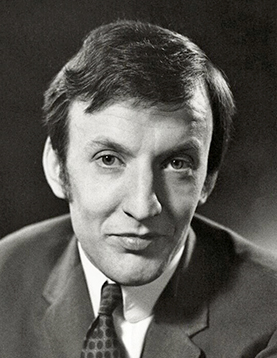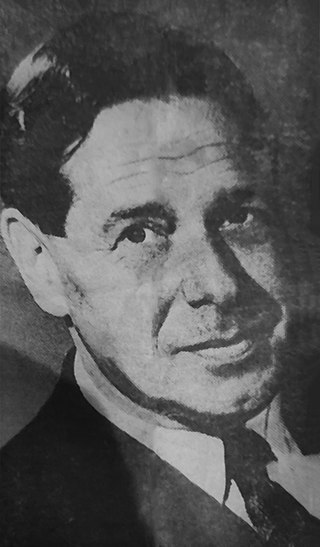Related Research Articles
This is a list of notable events in music that took place in the year 1951.
This is a list of notable events in music that took place in the year 1914.
This is a list of notable events in music that took place in the year 1905.
Events in the year 1897 in music.
Events in the year 1890 in music.

Robert Eugene Ward was an American composer who is best remembered for his opera The Crucible (1961) after the 1953 play of the same name by Arthur Miller. He was awarded the Pulitzer Prize for Music for that opera in 1962.

Sir Richard Rodney Bennett was an English composer of film, TV and concert music, and also a jazz pianist and occasional vocalist. He was based in New York City from 1979 until his death there in 2012.
Thomas Z. Shepard is an American record producer who is best known for his recordings of Broadway musicals, including the works of Stephen Sondheim. Shepard is also a composer, conductor, music arranger and pianist.
Arthur Terence Galt MacDermot was a Canadian-American composer, pianist and writer of musical theater. He won a Grammy Award for the song "African Waltz" in 1960. His most-successful musicals were Hair and Two Gentlemen of Verona (1971). MacDermot also composed music for film soundtracks, jazz and funk albums, and classical music, and his music has been sampled in hit hip-hop songs and albums. He is best known for his work on Hair, which produced three number-one singles in 1969: "Aquarius/Let the Sunshine In", "Good Morning Starshine", and the title song "Hair".
Hall Franklin Overton was an American composer, jazz pianist and music teacher.
Joseph Horovitz was an Austrian-born British composer and conductor best known for his 1970 pop cantata Captain Noah and his Floating Zoo, which achieved widespread popularity in schools. Horovitz also composed music for television, including the theme music for the Thames Television series Rumpole of the Bailey, and was a prolific composer of ballet, orchestral, brass band, wind band and chamber music. He considered his fifth string quartet (1969) to be his best work.

Paul Dessau was a German composer and conductor. He collaborated with Bertolt Brecht and composed incidental music for his plays, and several operas based on them.

Arthur Leslie Benjamin was an Australian composer, pianist, conductor and teacher. He is best known as the composer of Jamaican Rumba (1938) and of the Storm Clouds Cantata, featured in both versions of the Alfred Hitchcock film The Man who Knew Too Much, in 1934 and 1956.
William Joseph Russo was an American composer, arranger, and musician from Chicago, Illinois, United States.
(Frank) Neely Bruce is an American composer, conductor, pianist, and scholar of American music. He is the composer of over 800 works including three full-length operas. Currently, he is John Spencer Camp Professor of Music and American Studies at Wesleyan University, where he has taught since 1974.
The cultural year was dominated by the Festival of Britain and the opening of The Royal Festival Hall, the first dedicated concert hall of its size to be built in London since 1893: located on the south bank of the Thames, this was to host concerts by major orchestras from Britain and abroad. The Festival itself was a celebration of music, art and theatre. It notably provided an opportunity for the staging of many events seen during the first Folk music Festival held in Edinburgh, organised with the help of such talents as the American Alan Lomax, the Irish traditional musician Seamus Ennis and the political theatre director Ewan MacColl, who would go on to form the Ballad and Blues Club.
Will Todd is an English musician and composer. He is a pianist, who performs regularly with others in his own works.
Richard Bunger Evans, also known as Richard Bunger, is an American composer and pianist who worked with John Cage and subsequently wrote "the classic book on John Cage," The Well-Prepared Piano. Evans has composed and performed music for opera and musical theatre, piano, art songs, prepared piano, choral music, string orchestra and chamber music. He continues to compose and perform in these various genres, and is especially respected as a collaborator with singers. During his 17-year career as a music professor, Evans was named one of two statewide Outstanding Professors of 1981–1982 in the 23-campus California State University system.
References
- ↑ "Arthur Cunningham, African American Composer & Pianist". Chevalierdesaintgeorges.homestead.com. Retrieved 2012-08-30.
- ↑ "Source Material for Wikipedia". 11 January 2014.
- Wright, Josephine. "Cunningham, Arthur". The New Grove Dictionary of Opera.
- Kozinn, Allan. "Arthur Cunningham, Jazz Pianist and Roving Composer, Dies at 68". The New York Times, April 3, 1997.